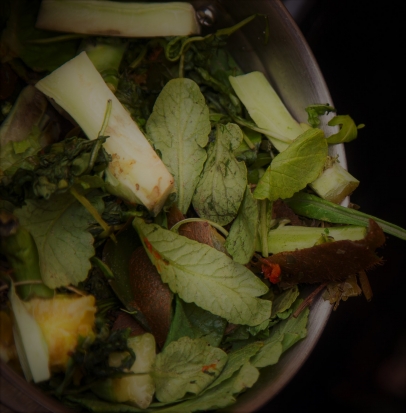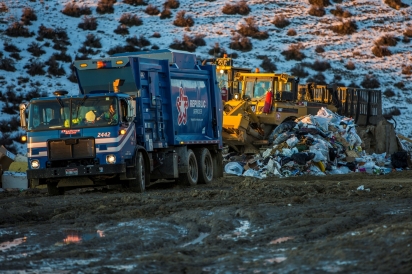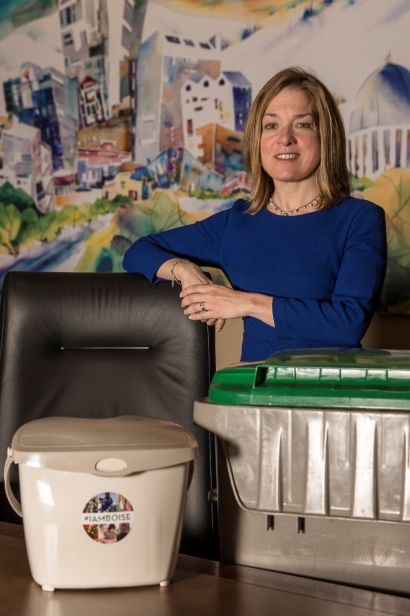WASTE NOT, WANT NOT: Idaho puts food waste on a mission
Your parents were right: The food you toss could feed the starving in sub-Saharan Africa.
People in wealthy nations throw away nearly as much food as the entire sub-Saharan African region consumes. The United Nations Environment Programme estimates we toss about 222 million tons of food every year that mostly ends up in places like the Ada County landfill.
If you’re an average American, you’re throwing away about 20 pounds of food every month. And if you’re a typical Idahoan, that waste ends up in the local landfill.
Those numbers add up in Idaho and point to a solution for local food insecurity and environmental degradation. Foodies, environmentalists, city leaders and hunger avengers continue to look for novel ways to reduce food waste, and programs on the horizon can help the average consumer reduce those numbers.
“At the Council we’ve really been focused at coming up with a fullspectrum waste program. We know that so much that goes into the landfill is organic,” said Boise City Council member Lauren Mclean.
About 46% of the waste that ends up in the Ada County landfill falls into the organic category. And it doesn’t have to end up in the landfill—at least not anymore.
“That’s huge,” Mclean said of the 46%. “By composting now we’re going to extend the life of the landfill. Think about it. almost half of what boise citizens are putting in the landfill is compostable. [By composting] we’ll be reducing the use of the landfill by half from a residential perspective. so it should last that much longer.”
Are you ready to compost? Most of us don’t have the space, time or know-how to become part of the soil cycle. Fret not.
Come summer, Boiseans can help reduce the size of the local landfill through a curbside city-wide composting program that aims to put a dent in food waste.
“By composting now we’re going to extend the life of the landfill. Think about it. Almost half of what Boise citizens are putting in the landfill is compostable. [By composting] we’ll be reducing the use of the landfill by half from a residential perspective. so it should last that much longer.” The program works a lot like the existing recycling program. For roughly $3.40 a month, residents can elect to participate by disposing organic
waste in a green compost cart that gets picked up during regular trash collection. Participants can use the finished compost for free.
“There’s a large cost that comes with creating new landfills and finding new places to put garbage. We could push that further out by having a composting program,” Mclean said.
Food waste not only impacts the environment but also hits consumers’ and producers’ budgets and bottom lines. Food waste strains family resources, forces farmers to eat losses and, when the waste occurs between the farm and table, sellers and restaurant owners see profits shrink. It adds up to billions of dollars in losses.
The Global Initiative on Food Loss and Waste Reduction puts those losses at $680 billion in industrialized countries, with north Americans leading the pack as the world’s biggest wasters.
The US Environmental Protection Agency recently called for a 50% reduction in food waste by 2030. A modest amount, when you consider that 96% of an average American’s food waste ends up in landfills. When that waste decomposes, it releases methane gas that packs 21 times the global warming potency as carbon dioxide.
At the grower level, some Idaho fields have become ground zero for waste reduction when harvest time rolls around. At Boise’s Peaceful
Belly Farm, Idaho Foodbank volunteers walk behind tractors, gleaning the fields for leftover veggies the mechanical harvest missed. This
human-picked food brings much-needed fresh produce to local residents facing food insecurity.
Peaceful Belly co-owner Josie Erskine says the farm could leave the food on the ground to decompose and enrich the next crop, but Peaceful Belly has a bigger mission.
“It has no environmental impact but it has a social value. It really is food for someone,” Erskine said. “We are trying to bring food to our community and we’re trying to serve every demographic of that community.”
Food waste reduction brings fresh produce to the hungry, and area businesses help lessen the waste load with food bank donations to area
charities. But Erskine said policies keep a lot of food waste from going to the neediest. “There’s so much that can be done with food waste. If
you look at our grocery stores, it’s illegal to take the food waste,” Erskine explained. “It’s a huge barrier.” “No one should go hungry. There’s so many missing links in the food waste chain and it’s tied to hunger and it’s tied to the environment.”







